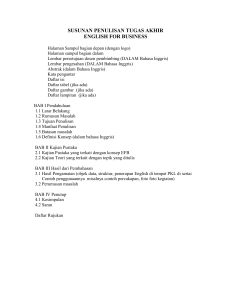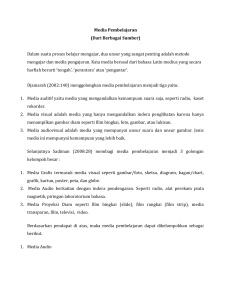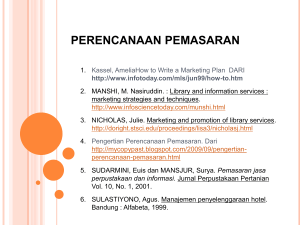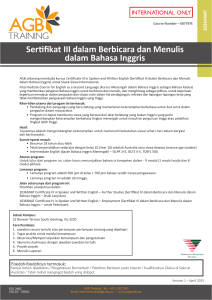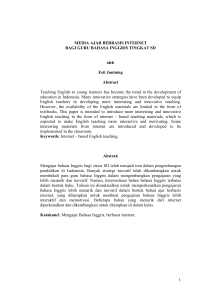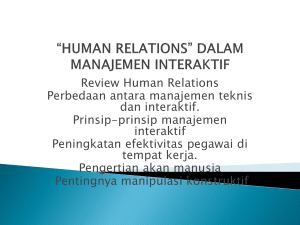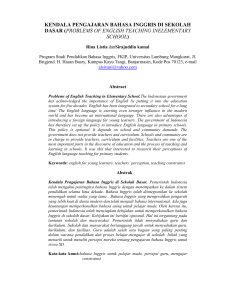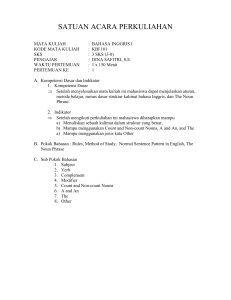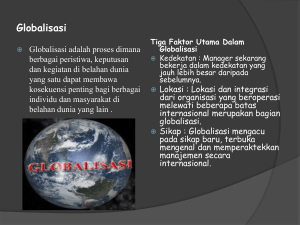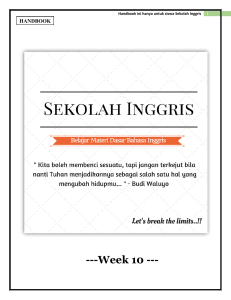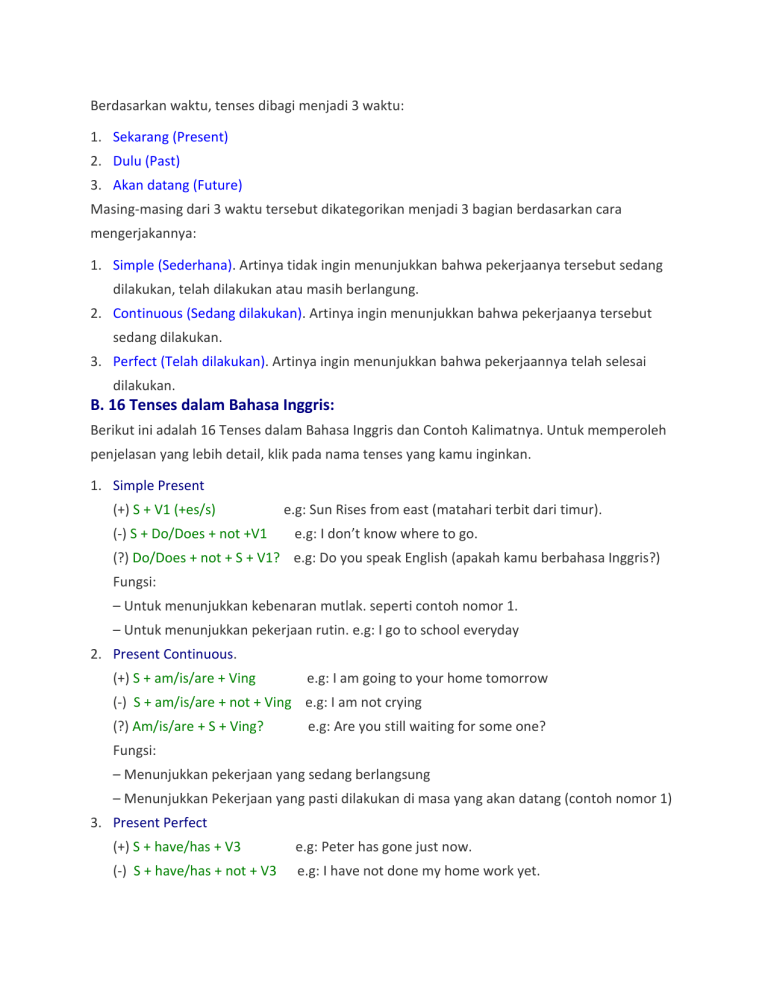
Berdasarkan waktu, tenses dibagi menjadi 3 waktu: 1. Sekarang (Present) 2. Dulu (Past) 3. Akan datang (Future) Masing-masing dari 3 waktu tersebut dikategorikan menjadi 3 bagian berdasarkan cara mengerjakannya: 1. Simple (Sederhana). Artinya tidak ingin menunjukkan bahwa pekerjaanya tersebut sedang dilakukan, telah dilakukan atau masih berlangung. 2. Continuous (Sedang dilakukan). Artinya ingin menunjukkan bahwa pekerjaanya tersebut sedang dilakukan. 3. Perfect (Telah dilakukan). Artinya ingin menunjukkan bahwa pekerjaannya telah selesai dilakukan. B. 16 Tenses dalam Bahasa Inggris: Berikut ini adalah 16 Tenses dalam Bahasa Inggris dan Contoh Kalimatnya. Untuk memperoleh penjelasan yang lebih detail, klik pada nama tenses yang kamu inginkan. 1. Simple Present (+) S + V1 (+es/s) (-) S + Do/Does + not +V1 e.g: Sun Rises from east (matahari terbit dari timur). e.g: I don’t know where to go. (?) Do/Does + not + S + V1? e.g: Do you speak English (apakah kamu berbahasa Inggris?) Fungsi: – Untuk menunjukkan kebenaran mutlak. seperti contoh nomor 1. – Untuk menunjukkan pekerjaan rutin. e.g: I go to school everyday 2. Present Continuous. (+) S + am/is/are + Ving e.g: I am going to your home tomorrow (-) S + am/is/are + not + Ving e.g: I am not crying (?) Am/is/are + S + Ving? e.g: Are you still waiting for some one? Fungsi: – Menunjukkan pekerjaan yang sedang berlangsung – Menunjukkan Pekerjaan yang pasti dilakukan di masa yang akan datang (contoh nomor 1) 3. Present Perfect (+) S + have/has + V3 e.g: Peter has gone just now. (-) S + have/has + not + V3 e.g: I have not done my home work yet. (?) Have/has + S + V3? e.g: Have you already taken a bath? Fungsinya: – Menunjukkan pekerjaan yang telah usai pada saat sekarang. 4. Present Perfect Continuous (+) S + have/has + been + Ving e.g: It has been raining since at six o’clock (-) S + have/has + not + been + Ving e.g:I haven’t been eating for whole day (?) Have/has + S + been + Ving e.g: Has she been waiting for me for a long this time? Fungsi: – Untuk menunjukkan pekerjaan yang sudah terjadi dan masih ada kemungkinan terjadi sampai nanti. 5. Simple Past. (+) S + V2 + O e.g: I went to school alone yesterday. (-) S + did + not + Inf (V1) e.g: You didn’t tell that you took my money yesterday. (?) Did + S + Inf (V1) e.g: Did you came home last year? Fungsi: Menunjukkan pekerjaan yang terjadi pada masa lampau, tanpa ingin menekankan bahwa ia sedang, atau telah selesai melakukan pekerjaan tsb. 6. Past Continuous. (+) S + was/were + Ving e.g: I was sleeping when you came. (-) S + was/were + not + Ving e.g: You weren’t listening to me when I was singing (?) Was/were + S + Ving e.g: Was she still reading while father called her? Fungsi: Untuk menunjukkan pekerjaan yang sedang terjadi pada masa lampau, ketika pekerjaan lain terjadi, baik pekerjaan lain itu menyela (seperti contoh nomor1) atau terjadi bersama-sama (seperti contoh nomor 2). 7. Past Perfect. (+) S + Had + V3 e.g: She had gone before you came (-) S + Had + not + V3 e.g: I hadn’t already taken a bath when you visit me (?) Had + S + V3 e.g: had you already graduated from senior high school last year? Fungsi: Untuk menunjukkan pekerjaan yang telah selesai ketika pekerjaan lain baru dimulai pada masa lampau. 8. Past Perfect Continuous. (+) S + had + been + Ving e.g: Rooney had been playing football for 3 years till he decided to stop last year. (-) S+had+not+been+Ving e.g: I had not learning English for a year at 2010 (?) had+S+been+Ving e.g: Had father been working at PT.Astra for 10 years last year? Fungsi: Untuk menunjukkan pekerjaan yang sudah terjadi pada masa lalu dan masih berlangsung hingga waktu tertentu pada masa lampau. 9. Simple Future. (+) S + will + Inf (V1) e.g: I will always love you if you love me to (-) S + will+ not + Inf (V1) e.g: I won’t let you go (?) Will + S + Inf (V1) e.g: will you come to my party? Fungsinya: – Menunjukkan pekerjaan sederhana yang akan terjadi – Untuk membuat Conditional Sentence type I. 10. Future Continuous. (+) S + will + be + Ving e.g: he will be climbing Krakatau with her friends on sunday (-) S+ will + not + be + Ving e.g: I wont be traveling next week. (?) Will + S + be + Ving e.g: will you be still sleeping at 7 a.m tomorrow morning? Fungsi: – Untuk menunjukkan pekerjaan yang sedang terjadi pada masa yang akan datang. 11. Future Perfect. (+) S + will + have + V3 e.g: he will have arrived by the end of this month (-) S + will + have + not + V3 e.g: he will not have slept at the time you go home. (?) Will + S + have + V3 e.g: will you have taken bath at 4 pm? Fungsi: – Untuk menunjukkan pekerjaan yang telah selesai di masa yang akan datang. 12. Future Perfect Continuous. (+) S+will+have+been+Ving, e.g: he will have been working for 3 hours at 9 am tomorrow. (-) S+will+have+not+been+Ving, e.g: she will have not been traveling for 3 weeks next sunday. (?) Will+S+have+been+Ving, e.g: will you have been diving in the sea for 3 hours at mid day? Fungsi: – Sama dengan Present Perfect Continuous, bedanya: kejadiannya tidak sekarang tapi di masa depan. 13. Past Future. (+): S + would + Infinitive/V1, e.g: I would have gone if you didn’t prevent me. (-): S + would + not + Infinitive/V1, e.g: You would not come to your party yesterday, whatever happened. (?): Would + S + Infinitive/V1, e.g: would you attend my wedding party if I invited you? Fungsi: – Untuk menunjukkan pekerjaan yang akan dilakukan pada masa lampau. – Untuk membuat kalimat Conditional Sentence Type II. 14. Past Future Continuous. (+) S + would + be + Ving e.g: When I was born, He would be working at this company for 2 years (-) S + would + not + be + Ving e.g: You would not be walking alone, if I were not sick. (?) Would + S + be + Ving e.g: would you be standing by me, if I slept yesterday? Fungsi: – Untuk menunjukkan pekerjaan yang akan sedang dilakukan di masa lampau. 15. Past Future Perfect. (+) S + would + have + been + V3 e.g: This house would have been painted if all workers had came yesterday. (-) S + would + not + have + been + V3 e.g: It would not have been finished by the end of last month. (?) Would +S+ have+ been+ V3 e.g: Would he have been delivered all my orders if I had paid my bill? Fungsi: – Untuk menunjukkan pekerjaan yang akan sudah selesai dilakukan pada masa lampau. – Untuk membuat kalimat Conditional Sentence Type III. 16. Past Future Perfect Continuous. (+) S + would + have + been + V-ing e.g: You would have been sleeping (-) S + would + not + have + been + V-ing e.g: She would not have been crying (?) Would + S + have + been + V-ing? e.g: Would you have living at London for 3 years last year? Fungsi: – Untuk menunjukkan pekerjaan yang sedianya akan telah dilakukan dan masih dilakukan pada masa lalu. Degree Of Comparison (Tingkat Perbandingan) Degree of comparison / comparison degree / tingkat perbandingan Ada 3 bagian degree of comparison : 1. Positive Degree (tingkat positif) Positive degree sering diartikan “se… atau sama….” Rumus : S + tobe + as adjective as + object Contoh : 1. the girl is as beautiful as her 2. my house is not as clean as your house 3. is your father as high as my father 2. Comparative Degree (tingkat lebih) Comparative degree ini sering diartikan dengan tingkat “lebih” dan ada beberapa cara untuk membentuk comparative degree ini, yakni : a) kalau kata sifatnya terdiri dari satu / dua suku kata (syllable), maka untuk mengubahnya ke tingkat comparative degree, yakni dengan menambahkan akhiran “er” dibelakang kata sifatnya dan diikuti oleh kata “than” yang artinya “dari pada”. Rumus : S + tobe + Adjective + Er + than + object Contoh : - he is clever than me - danau toba is deeper than sungai kama - is your house cleaner than her house? b) Namun kalau kata sifatnya lebih dari dua suku kata, maka untuk membentuk comparative degreenya harus menggunakan “more” dan diikuti oleh “than” Rumus : S + tobe + the + Adjective + than + object Contoh : - he is more handsome than me - this book is more expensive than that book - is mathematic more difficult than physic? 3. Superlative Degree (tingkat paling) Superlative degree ini sering diartikan dengan tingkat “paling” dan ada juga beberapa cara untuk membentuk superlative degree ini, yakni : a) Kalau kata sifatnya terdiri dari satu / dua suku kata (syllable) maka untuk membentuk superlativenya yakni dengan menambahkan akhiran “est” dibelakang kata sifatnya dan diikuti oleh “the”. Rumus : S + tobe + the + Adjective + Est + object Contoh : - he is the cleverest in the class - our house is the cleanest in our village - is he the smallest in his school? b) Namun kalau kata sifatnya lebih dari dua suku kata, maka untuk membentuk superlative degree nya harus menggunakan “the most” di depan kata sifatnya. Rumus : S + tobe + the most + Adjective + object Contoh : - he is the most handsome in this class - my book is the most expensive Note : 1. Jika kata sifatnya 1 atau 2 suku kata berakhiran “y” maka “y” diubah menjadi “i”. Contoh : o Lazy > lazier / laziest o Crazy > crazier / craziest o Ugly > uglier / ugliest 2. Jika kata sifat 1 atau 2 suku kata berakhiran “some, ing, id, ous, ed, od, ect, cy and est” maka untuk mengubahnya ketingkat lebih atau pun paling menggunakan “more & the most” Contoh : o Stupid > more stupid / the most stupid o Handsome > more handsome / the most handsome o Famous > more famous / the most famous o Perfect > more perfect / the most perfect 3. Jika kata sifatnya berpola KVK (Konsonan Vokal Konsonan) maka huruf terakhir harus di dabalkan. Contoh : o Hot > hotter / hottest o Big > bigger / biggest o Thin > thinner / thinnest 4. Jika kata sifatnya berakhiran –er yang berakhiran 2 suku kata maka untuk membuatnya ketingkat lebih atau paling, boleh menggunakan “er, more atau est, the most” Contoh : o Clever > cleverer, more clever / cleverest, the most clever 5. Jika kata sifatnya color maka untuk membuat ketingkat lebih atau paling, harus menggunakan more / the most Contoh : - Black > more black / the most black - White > more white / the most white Rumus Passive Voice Dalam 16 Tenses Berikut adalah rumus passive voice dalam 16 tenses lengkap disertai dengan asal kalimat active voice nya No Tenses Active Voice Passive Voice S + V1 + O 1 Present Simple Tense Many people speak English 2 3 4 5 6 7 8 S + to be (am, are, is) + V3 + by + O English is spoken by many people S + to be (am, are, is) + being + V3 + S + to be (am, are, is) + V1-ing + O by + O English is being spoken by many Present Continuous Many people are speaking English people Tense S + have/has + V3 + O S + have/has + been + V3 + by + O English has been spoken by many Present Perfect Tense Many people have spoken English people S + have/has + been + being + V3 + S + have/has + been + V1-ing + O by + O Many people have been speaking English has been being spoken by Present Perfect English many people Continuous Tense S + V2 + O S + to be (was, were) + V3 + by + O Many people spoke English English was spoken by many people Past Simple Tense S + to be (was, were) + being + V3 + S + to be (was, were) + V1-ing + O by + O English was being spoken by many Past Continuous Tense Many people were speaking English people S + had + V3 + O S + had + been + V3 + by + O English had been spoken by many Many people had spoken English people Past Perfect Tense S + had + been + being + V3 + by + S + had + been + V1-ing + O O Many people had been speaking English had been being spoken by Past Perfect English many people Continuous Tense S + wi S + will not + V1 + O 9 Future Simple Tense Future Continuous 10 Tense Many people will speak English S + will + be + V1-ing + O Many people will be speaking English 11 Future Perfect Tense S + will + have + V3 + O Many people will have spoken English ll be + V3 + by + O English will be spoken by many people S + will + be + being + V3 + by + O English will be being spoken by many people S + will + have + been + V3 + by + O English will have been spoken by many people Future Perfect 12 Continuous Tense Past Future Simple 13 Tense Past Future 14 Continuous Tense Past Future Perfect 15 Tense Past Future Perfect 16 Continuous Tense S + will + have + been + V1-ing + O Many people will have been speaking English S + would + V1 + O S + will + have + been + V1-ing + O English will have been being spoken by Many people S + would + be + V3 + by + O English would be spoken by many Many people would speak English people S + would + be + being + V3 + by + S + would + be + V1-ing + O O Many people would be speaking English would be being spoken by English many people S + would + have + been + V3 + by S + would + have + V3 + O +O Many people would have spoken English would have been spoken by English many people S + would + have + been + V1-ing S + would + have + been +being + +O V3 + by + O Many people would have been English would have been being speaking English spoken by many people
